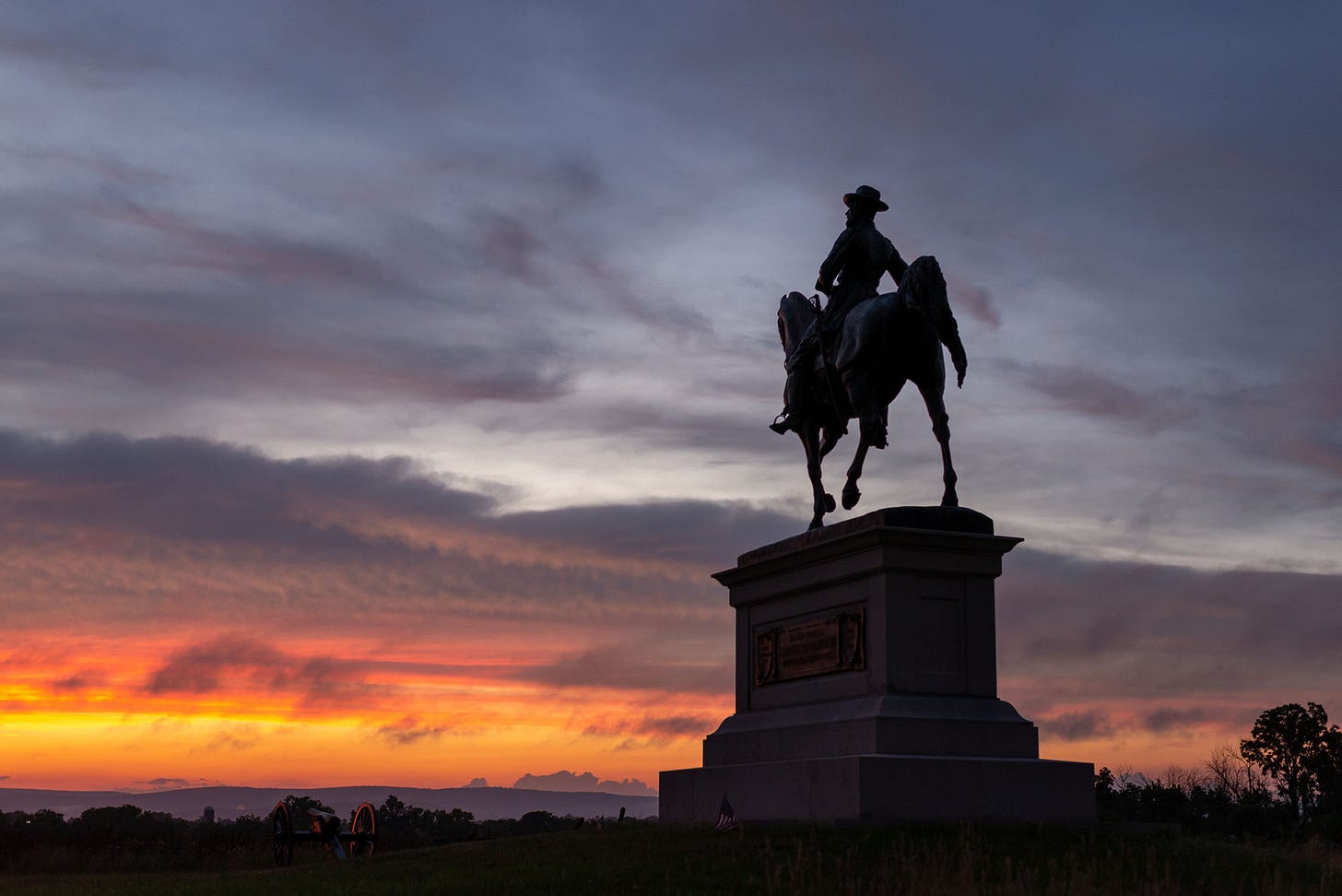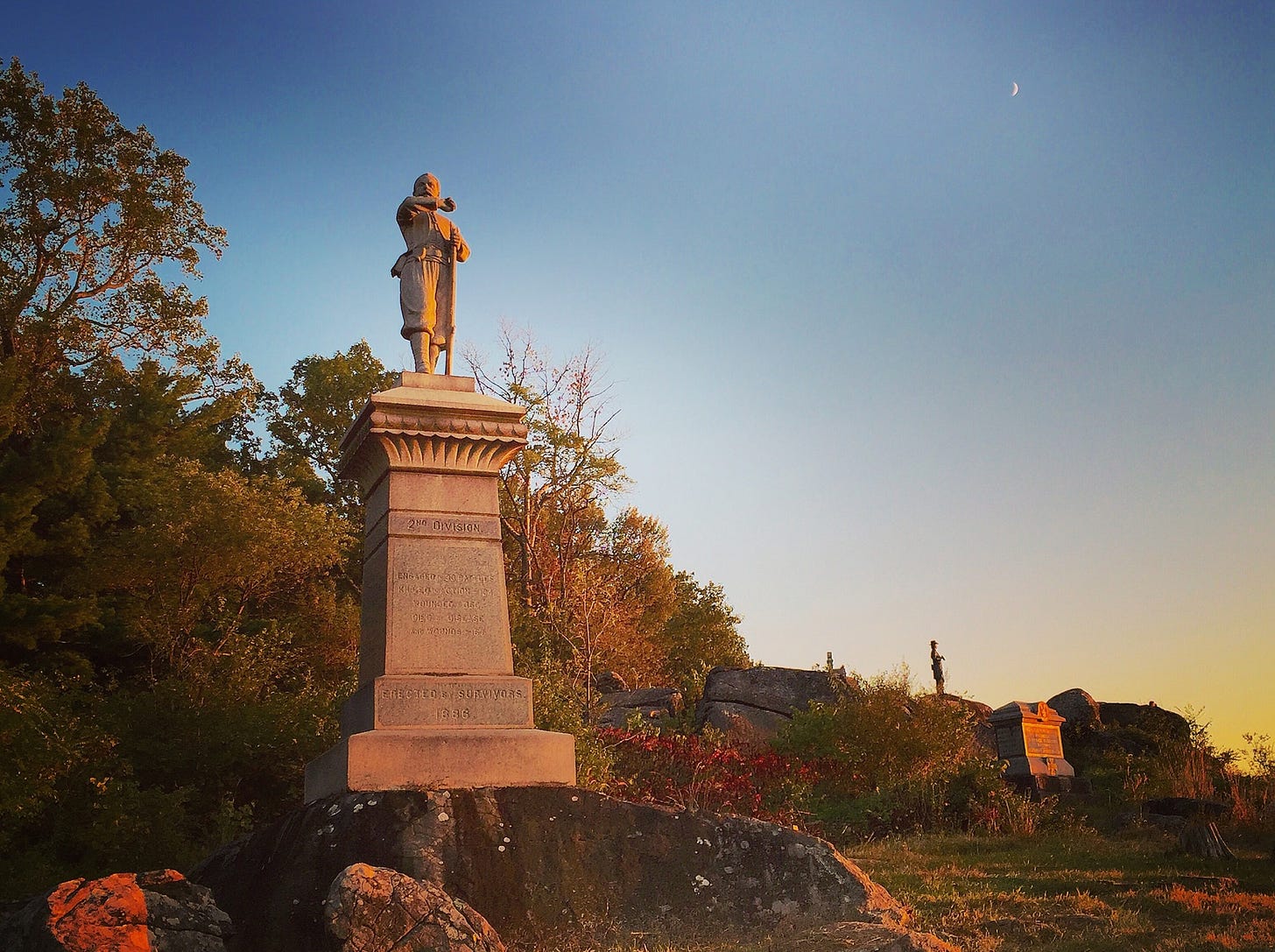The Battle for Democracy Continues: From Gettysburg to the Fight for Public Lands
July 3 is the anniversary of the end of the Battle of Gettysburg, a turning point in the Civil War
On July 3, 1863, the thunder of cannon fire faded over the fields of Gettysburg, Pennsylvania.
The bloodiest battle in American history—up to 51,000 dead, wounded, or missing—came to its brutal end. And though the Civil War would rage on for nearly two more years, Gettysburg marked the turning point. The Union endured. Democracy, battered and blood-soaked, held fast.
Today, as we stand more than 160 years removed from that pivotal moment, the fields of Gettysburg are quiet, but their message is no less urgent.
They speak to sacrifice, resolve, and what it means to inherit a nation not as a gift, but as a responsibility. They are not just relics of the past—they are reminders of what is required to uphold the ideals for which Americans once died.
It is fitting that Gettysburg is now a national military park—public land, protected not for profit, but for posterity.
The fields remain open and free to all, not parceled to the highest bidder or paved over for commercial gain.
They are stewarded by the National Park Service, a civilian army of historians, rangers, scientists, and public servants who, in their own quiet way, carry forward the legacy of sacrifice by preserving the hallowed land itself.
But today, that promise is under threat.

Across America, the very concept of public land—land that belongs to all of us—is being chipped away.
Whether by underfunding, legislative assaults, privatization, censoring of history, or subtle bureaucratic sabotage, we are witnessing a creeping erosion of one of the most democratic institutions ever devised: the shared stewardship of our natural and historic heritage.
The attack comes in many forms. This year alone, politicians have introduced bills to sell off federal land to private interests, pushed to roll back protections on national monuments, and gutted environmental regulations that preserve the integrity of our public spaces.
Under the guise of “local control,” “unleashing energy,” or “economic development,” the real motive is often profit—fossil fuels, minerals, timber, and land speculation.
This trend dishonors the spirit of Gettysburg.
The men who fought and fell there did so not for private gain, but for an idea: that a government “of the people, by the people, for the people, shall not perish from the Earth,” as Lincoln so famously said during his Gettysburg Address, four and a half months after the battle’s end.
Public lands are a tangible expression of that ideal. They are places where the American experiment manifests physically—where anyone, regardless of wealth or status, can set foot on the same ground as presidents and pioneers, heroes and ordinary citizens.
We must remember: the National Park Service was born out of a civic awakening.
Even during the Civil War, realizing what could happen, Lincoln took the time to sign the Yosemite Grant Act, which protected the Yosemite Valley and Mariposa Grove as wilderness areas.
It was the first time in American history the federal government had ever done something like that, effectively laying the groundwork for the National Park System we know, love, and cherish today.
And after the Civil War, as America began to heal and expand westward, leaders like Ulysses S. Grant (who established Yellowstone National Park), and later Theodore Roosevelt (who protected 230 million acres of public lands) recognized that the story of our nation was not just in its battles and buildings, but in its landscapes.
The land itself carried the soul of the republic. From Gettysburg to Yellowstone, from the Independence Hall to the Arctic National Wildlife Refuge, these places became living symbols of what we fought to preserve: liberty, equality, and the common good.
Today, as we mark another anniversary of Gettysburg, we have to address the uncomfortable truth that we are failing that legacy.
Recent Supreme Court decisions have weakened the federal government’s ability to regulate environmental protections. Proposed legislation in Congress aimed to redirect proceeds from public land sales away from conservation and toward general treasury coffers—effectively turning nature into a piggy bank.
The rollback of the Roadless Rule, which once safeguarded 58 million acres of undeveloped national forest—areas with more wilderness value than even most national parks—opens those fragile ecosystems to roads, logging, and industry.
These are not acts of stewardship. They are acts of forgetting, of losing sight of the future.
And yet, not all is lost. There’s still hope.
Across the country, a new generation of Americans is rising to meet the moment. raising their voices to protect our public lands—tribal nations reclaiming ancestral stewardship, young activists demanding climate action, veterans finding healing in wilderness, conservative hunters speaking up against their own Congresspeople, and rural communities rallying to protect their local access to federal lands.
The spirit of Gettysburg—resilience, unity, and sacrifice—lives on in these acts of collective guardianship.
And this is why: the defense of public lands not as a partisan issue, but a patriotic one.
The battle for preservation is not about left or right. It’s not about blue or red—it is about right and wrong.
Just as the fields of Gettysburg were once defended by citizen-soldiers, today’s parks, forests, rivers, and coastlines need citizen-stewards.

So, on this July 3, as we remember the guns falling silent over Cemetery Ridge, let’s not relegate Gettysburg to a sepia-toned past. Let’s hear its call anew: to protect what binds us together—not just in theory, but in soil and stone, water and sky.
Public lands are not just recreation spaces. They are moral spaces. They are where we prove, again and again, that the American promise still holds.
If we choose to honor the past not with nostalgia, but with action, we can ensure that the legacy of those who fell at Gettysburg is not entombed in history, but alive in every trail hiked, every battlefield preserved, every wilderness defended, and every voice raised for the land we share.
Use this convenient from created by the National Parks Conservation Association to urge Congress to properly fund the National Park Service.




